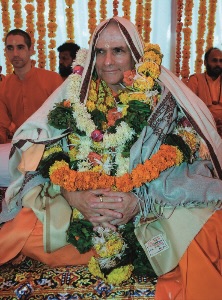BY SWAMI SHANKARANANDA
Hinduism, in the course of its long history, has always adjusted itself to changing circumstances Today we live the evolutionary encounter of Hinduism and Western culture. Scholar Georg Feuerstein wrote, echoing Carl Jung and Arnold Toynbee: “The westward movement of Eastern teachings is a most decisive event in our time, one which has already transformed the West.”
With regard to this westward flow of Hinduism, the key landmark is surely Swami Vivekananda’s famous talk at the first Parliament of the World’s Religions in Chicago in 1893. Eastern influences were already making an impact by then: the Theosophical Society had been founded in 1875, and German and American transcendentalists had been reading the Upanishads and the Bhagavad Gita for nearly a century. However, Vivekananda’s talk opened the floodgates of visits by Hindu gurus to the West, a movement which reached a peak around 1970 when major teachers began their ministry.
Sanatana Dharma holds that behind every religion there is an unseen essence: the Self, or Brahman.The highest understanding of Sanatana Dharma is that it implies non-dual awareness, as in “Aham Brahmasmi”–“I am Brahman.” We know that as long as a person is alive the Self exists within them, even if they lose their way and wander in misery and ignorance. In the same way, the essence of every religion is always present, even when that religion goes through a less enlightened period. That very Self of religion is nothing but the Sanatana Dharma.
However, when most Western seekers look at the broad expanse of Hinduism, they find themselves absorbing it gradually. The West is generally interested in yoga, asanas, kirtan, meditation, gurus, non-dual philosophy and the concepts of karma, reincarnation and dharma. Therefore, Western Hinduism is interested in the aspects of Hinduism that are spiritual, yet logical for the intellectual mind.
In my own spiritual path a critical moment occurred when I discovered that great beings who realized Truth still exist in our time. Soon after I was off to India, where I met my guru, Baba Muktananda. Because of these great living souls, Hinduism has spread beyond India’s borders and traveled around the world. Theirs was not a merely philosophical or intellectual influence. The great pioneering Indian masters actually gave an awakening to students. They gave shaktipat (mystical initiation), awakening the kundalini energy. As a result, there are thousands, maybe even millions, of Westerners who have been awakened, accepted a guru and are now doing sadhana, meditating, attending satsangs and reading Hindu scripture. Such is the influence of great Indian gurus.
In 1893, when Swami Vivekananda gave his talk, yoga and meditation were unknown in the West. Today, 118 years later, they are everywhere. There are yoga studios in every shopping center. Every other celebrity is meditating and lots of ordinary people are, too. Kirtan is spreading like wildfire. And now a remarkable percentage of Americans and Australians accept the notions of karma and reincarnation. In short, Hindu philosophy and practices are widespread in the West.
I believe Hinduism is the unacknowledged inspiration behind much of contemporary spirituality. Words like guru, aum, mantra, shanti, samadhi, yoga, karma, pandit, chakra, prana and shakti have become English words. There are sports gurus, business gurus, and even golf mantras. Not only have all these ideas penetrated the West, but, more importantly, people are actually doing sadhana. Practice, or sadhana, is the difference between belonging to a religion and being firmly on a path.
I observe the extraordinary fact that, for the first time in history, we have legitimate Western Hindu gurus from authentic lineages. This suggests that something new is emerging. When a religion meets a new culture, an alchemy happens. Because Western seekers have grown up in a different culture, they take a different eye to the Hindu traditions, valuing and adopting the elements of the Hindu dharma that speak to them. From the point of view of orthodoxy, this is a tragedy. But from the point of view of the Sanatana Dharma, it is an evolutionary necessity.
No one knows where the integration of East and West will lead, but it is a fascinating process. One thing is certain: the growth of Western Hinduism will continue. Overall, a new, worldwide Hinduism is emerging, but the inner core of the Sanatana Dharma can never change. It will continue to bring light to the world.
Hinduism has great freedom and flexibility. When a disciple reaches spiritual maturity, he attains a deep relationship with the Divine, becoming a sage who may blend traditional and innovative methods. Hinduism does not stifle independence. The Shiva Sutras say, “Siddha svatantra bhava,” “A siddha is supremely free.”
The genius of Hinduism is that it forever expresses the dynamism of Divine revelation. It does not get bogged down in dogma and limitation. Forms are created, sustained and destroyed; new forms arise, blazing with the shakti of revelation.
I urge all Hindus to accept this new international form of the same ancient Hinduism, with its many seekers from foreign lands. Hindus have every reason to be proud that the great teachings of the Hindu sages have spread around the world. This is not a distortion of Vedic culture but a tribute to the greatness and universality of these teachings. India is the spiritual mother of the world.
I belong to an ancient lineage of great masters. I revere my own tradition while respecting others. Hinduism is free enough to meet each new situation with courage and creativity. This new wave is an expression of the same force that manifested as the Vedas numberless years ago. It is the widest, broadest and most tolerant path. As such, it will not go wrong.
Mahamandaleshwar Swami Shankarananda is an American-born guru in the lineage of Bhagavan Nityananda of Ganeshpuri. An authority on the philosophy and practice of Kashmir Shaivism, he founded the Shiva Ashram near Melbourne, Australia, where he lives.
